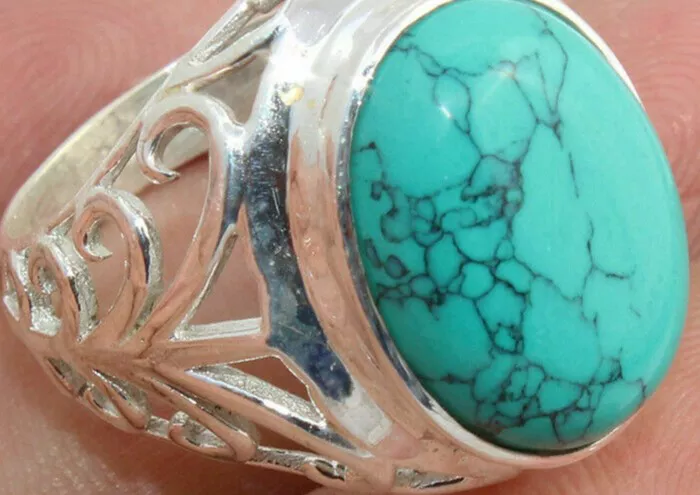Turquoise is a beautiful and unique gemstone. Many people wonder if it is a good choice for a ring. The answer is yes, but there are important factors to consider. This article will explore the pros and cons of turquoise rings. We will discuss durability, care, style, and value. By the end, you will know if a turquoise ring is right for you.
What is Turquoise?
Turquoise is a blue-to-green mineral. It forms in dry, rocky areas. The stone gets its color from copper and iron. The most famous turquoise comes from Iran, the Southwestern United States, and China. Turquoise has been used in jewelry for thousands of years. Ancient Egyptians, Persians, and Native Americans all valued it highly.
Why Choose Turquoise for a Ring?
Turquoise has many qualities that make it great for rings.
Unique Color – Turquoise has a striking blue or green shade. No two stones look exactly the same. This makes each ring special.
Cultural Significance – Many cultures believe turquoise brings protection and good luck. It has deep spiritual meaning.
Affordability – Compared to diamonds or sapphires, turquoise is often more affordable. You can get a beautiful ring without spending too much.
Lightweight – Turquoise is not as heavy as other gemstones. This makes rings comfortable to wear.
Versatility – Turquoise looks great in different styles. It works with silver, gold, and bohemian designs.
Durability of Turquoise Rings
One concern people have is durability. Turquoise is softer than many gemstones. On the Mohs hardness scale, it ranks between 5 and 6. This means it can scratch or chip if not cared for properly.
Pros for Durability:
It is hard enough for occasional wear.
With a protective setting (like a bezel), it can last longer.
Cons for Durability:
Not ideal for daily heavy wear (like an engagement ring).
Can be damaged by chemicals, heat, or hard impacts.
If you want a turquoise ring for everyday use, choose a sturdy setting. Avoid wearing it during rough activities like gardening or sports.
Best Ring Styles for Turquoise
Turquoise works well in different ring designs. Here are some popular options:
Silver and Turquoise Rings – Silver complements turquoise beautifully. This is a classic Southwestern style.
Gold and Turquoise Rings – Gold adds luxury. It makes the blue or green color stand out.
Bezel-Set Turquoise Rings – A bezel setting protects the stone by surrounding it with metal.
Vintage Turquoise Rings – Antique designs often feature intricate details.
Statement Rings – Large turquoise stones make bold fashion pieces.
How to Care for a Turquoise Ring
Since turquoise is delicate, proper care is important. Follow these tips:
Avoid Water and Chemicals – Water, perfume, and cleaning products can damage the stone. Take off your ring before washing hands or swimming.
Clean Gently – Use a soft, dry cloth. Do not soak the stone or use harsh cleaners.
Store Safely – Keep it in a soft pouch or jewelry box to prevent scratches.
Avoid Extreme Temperatures – Heat can cause cracks or color changes.
Check the Setting – Over time, the prongs or bezel may loosen. Have a jeweler inspect it yearly.
Is Turquoise a Good Engagement Ring?
Some people consider turquoise for engagement rings. It is a meaningful stone, but there are drawbacks.
Pros:
Unique and non-traditional.
Symbolizes love, protection, and good fortune.
Cons:
Not as hard as diamonds or sapphires. It may scratch or chip over time.
Requires more maintenance.
If you love turquoise, you could use it in an engagement ring. But it may not last as long as harder stones. A good alternative is to wear it as a fashion ring instead.
Value of Turquoise Rings
Turquoise prices vary based on quality. Factors that affect value:
Color: Bright, even blue is the most valuable. Greenish tones are usually cheaper.
Origin: Persian turquoise (from Iran) is highly prized. American turquoise (like Sleeping Beauty) is also valuable.
Treatment: Natural, untreated turquoise is worth more. Some stones are dyed or stabilized to improve color.
Craftsmanship: Handmade or designer rings cost more than mass-produced ones.
High-quality turquoise can be a good investment. Rare stones increase in value over time.
Ethical Considerations
When buying turquoise, it’s important to shop responsibly.
Avoid Fake Turquoise – Some sellers use dyed howlite or plastic. Always buy from trusted jewelers.
Support Ethical Mining – Some turquoise comes from unsafe or exploitative mines. Look for fair-trade or small-scale sources.
Respect Native American Art – If buying Native-made jewelry, ensure it is authentic and supports indigenous artists.
Who Should Wear a Turquoise Ring?
Turquoise rings suit many people. They are perfect for:
Those who love unique, colorful jewelry.
People who prefer bohemian or vintage styles.
Anyone who values spiritual or cultural meaning in jewelry.
They may not be ideal for:
People who want a low-maintenance, everyday ring.
Those who work with their hands a lot.
Conclusion
Turquoise is a great choice for a ring if you love its beauty and meaning. It is not the most durable stone, but with proper care, it can last for years. Choose a protective setting and avoid harsh conditions. Turquoise rings are affordable, stylish, and full of history.
If you want a unique piece with cultural significance, a turquoise ring is a wonderful option. Just remember to care for it properly. Whether for fashion or a special occasion, a turquoise ring can be a treasured part of your jewelry collection.
By understanding its strengths and weaknesses, you can decide if turquoise is the right gemstone for your ring. With the right choice, you’ll enjoy its beauty for a long time.
Related topics:
How Durable Is Turquoise Ring?
How Can I Tell if My Turquoise Is Real
How Many Kinds of Turquoise Are There?


